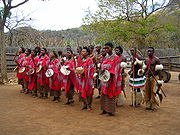
Tourism in Swaziland
Encyclopedia

Swaziland
Swaziland, officially the Kingdom of Swaziland , and sometimes called Ngwane or Swatini, is a landlocked country in Southern Africa, bordered to the north, south and west by South Africa, and to the east by Mozambique...
is a successful industry. Most of the tourists who visit Swaziland arrive by road from South Africa. Swaziland's tourism industry developed during the apartheid era in South Africa
South Africa
The Republic of South Africa is a country in southern Africa. Located at the southern tip of Africa, it is divided into nine provinces, with of coastline on the Atlantic and Indian oceans...
and this shaped many of its distinctive attractions. Since the end of apartheid, Swaziland has emphasized its traditional culture as a tourist attraction.
Apartheid Era
The adoption of apartheid in South Africa and civil warMozambican Civil War
The Mozambican Civil War began in 1977, two years after the end of the war of independence. The ruling party, Front for Liberation of Mozambique , was violently opposed from 1977 by the Rhodesian- and South African-funded Mozambique Resistance Movement...
in Mozambique
Mozambique
Mozambique, officially the Republic of Mozambique , is a country in southeastern Africa bordered by the Indian Ocean to the east, Tanzania to the north, Malawi and Zambia to the northwest, Zimbabwe to the west and Swaziland and South Africa to the southwest...
contributed to Swaziland's appeal as an alternative tourist destination in Southern Africa. This led to growth in Swaziland's tourism industry from the 1960s to the 1990s. During the apartheid era in South Africa, Swaziland drew many visitors by adopting different policies than South Africa. Many tourists visited Swaziland during that time in order to watch television programs or sporting events that they could not view in South Africa. During apartheid in South Africa Swaziland also legalized gambling in order to draw tourists. The legalization of gambling in Swaziland brought significant economic prosperity.
The number of tourists visiting Swaziland increased from 89,015 in 1972 to 257,997 in 1989. In 1988 tourism was 3% of the GDP of Swaziland and more than 4% of its total exports. Although the traditional Monarchy of Swaziland has often been cited as a factor that attracts tourists, tourism has also been credited with causing modernization in Swaziland. Although the increases in tourism seen in Swaziland have been alleged to have caused an increase in prostitution
Prostitution
Prostitution is the act or practice of providing sexual services to another person in return for payment. The person who receives payment for sexual services is called a prostitute and the person who receives such services is known by a multitude of terms, including a "john". Prostitution is one of...
, there is no evidence that prostitution was a factor in the growth of the Swaziland tourism industry. The increase in tourism did cause the centers of prostitution in Swaziland to shift from mining areas to hotels.
Post-apartheid
After the end of apartheid in South Africa and conclusion of the Mozambican Civil War made its neighbors more appealing tourism destinations, the growth of the tourism industry in Swaziland decreased. Many of the tourists who visit Swaziland are traveling between Mozambique and South Africa. Most tourists only stay for one night and many visitors only take day trips to the country.Due to the lack of other major industries, tourism is viewed by many in Swaziland as a potential source for future economic growth. Since its establishment in 2003, the Swaziland Tourism Board has emphasized the fact that Swaziland is the last sub-Saharan Africa
Sub-Saharan Africa
Sub-Saharan Africa as a geographical term refers to the area of the African continent which lies south of the Sahara. A political definition of Sub-Saharan Africa, instead, covers all African countries which are fully or partially located south of the Sahara...
n monarchy. Royal celebrations such as the Incwala
Incwala
The Ncwala , also known as 'Festival of the First Fruits,' is an important Swazi religious ritual that takes place in the latter half of December, and continues into January of the successive year. It is an annual ceremony lasting three weeks that unites the inhabitants of Swaziland in order to...
Kingship festival are viewed as potential venues for greater tourism growth. They have also attempted to attract tourists to the game parks of Swaziland
Protected areas of Swaziland
Protected areas of Swaziland include any geographical area protected for a specific use.Within Swaziland there is a mix of national, private and community-owned protected areas...
. In 2006 Swaziland signed on to the Lubombo Route agreement along with South Africa and Mozambique. The agreement allowed tourists to travel across the three countries with a single visa.
External links
- Swaziland Tourism Authority
- Swaziland Travel Guide at WikitravelWikitravel-External links:* *...

